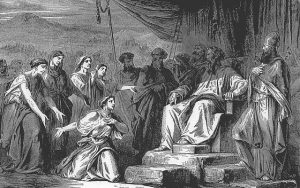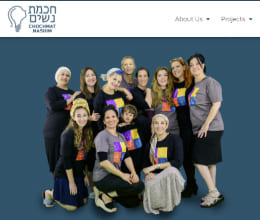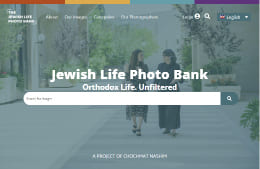
The Daughters of Zelophehad. (illustration from the 1908 Bible and Its Story Taught by One Thousand Picture Lessons, public domain)
The gloves are off in Brooklyn where the drama continues in the Hasidic neighborhood of Boro Park, New York. There, the members of the all-female EMS response unit, Ezras Nashim, are battling for legitimacy among their male peers. Last week, they had yet another day in court as part of their ongoing application for an ambulance license, a standard procedure made very un-standard by the powers that be in the local all-male EMT corps Hatzolah.
Hatzolah enjoys a monopoly – and the control that comes with it – on Jewish EMS in Boro Park. For years, they have stymied Ezras Nashim’s efforts to acquire equipment and support. Once again, they are throwing around their considerable weight, this time to oppose their application for an ambulance.
Watching the proceedings online, I couldn’t help but imagine how differently the story of the Daughters of Tzelofchad (read this past Shabbat), would have played out had it occurred within the current attitudes of some in the Jewish community of 2020.
* * *
On the plains of Moab…
24,000 men have just been decimated by a plague (syphilis?), due to their sexual depravity with the daughters of Moab. The 12 Tribes of Israel are camped by the Jordan River, overlooking Jericho, in anticipation of inheriting the Promised Land. A new census has been taken to prepare for the division of the land and it is declared that inheritance will go to men only.
Five sisters, Machla, Noa, Hogla, Milca, and Tirtza, the daughters of Tzelafchad of the tribe of Menashe, leave their tent and take the path that leads out of camp. They head toward the Tent of Meeting, where Moses communes with God.
Their leaving causes a stir. Women outside the camp? Curious onlookers follow the sisters (known for being unmarried orphans).
Despite their discomfort at the stir they are making, the sisters make their way through the crowd that sits outside the Tent of Meeting to hear the word of God through Moses.
Their dresses flutter in the hot breeze as they pass the gathered audience — men as far as the eye can see in the blazing desert sun.
Whispers erupt among the audience. As they pass the heads of the tribes towards the front of the crowd, someone shouts, “The women’s section is in the back!”
Undeterred, they continue, though their hearts beat faster, for what they are doing is “not done.” The sisters arrive at the entrance of the Tent of Meeting and stand before Moses and Elazar the Cohen, son of Aaron.
Machla, the eldest, addresses Moses. Respectfully but directly, she begins. Her voice carries through the bewildered silence of the audience and those that have followed them here. “Our father died in the desert -”
A shout from a man she cannot see interrupts her speech: “So did many men — traitors and idol worshipers all!”
Dark eyes flashing, but checking her anger, her sister Noa, responds, “He was not among the assembly gathered against Hashem with Korach. He died of his own sin.”
Another shout from the crowd, “So get your brothers to speak for you. You should not be here. This is not your place!”
Refusing to dignify the heckler, Hogla speaks only to Moses, “He had no son.”
A man stands, this one willing to show his face. He addresses the crowd. “Their father would be ashamed of their brazenness, coming before all these men. Why do they seek such attention?” He points to the women with his walking stick even as he deliberately averts his gaze. “It is not befitting a daughter of Israel!”
Milca decides to appeal to the assembled men (some of whom may have no sons), “Why should the name of our father be omitted from his family just because he has no son?”
Murmurs of consideration are heard throughout the crowd as they contemplate her words– some even seem to agree.
“Don’t listen to them!” shouts the first man, raising his stick in the air. “This is how they manipulate. They come in the guise of Torah, claiming to do the right thing, claiming good intentions, but they only want to advance themselves.” He glares at the men who had nodded in agreement with Milca. “Things are fine the way they are.”
The men look away, cowed by his insistence. Pressing his advantage, he stands on a rock, speaking louder and even more forcefully. “Good women don’t need to be in public. Good women don’t ask for things to change. Good women know their place, and their place is in the tent!”
Cheers echo across the desert as men pump their fists and stamp their feet. The sisters stand closer together but do not retreat.
“It’s true,” says a man in a blue tunic, jumping to stand beside the first. “My wife herself has no brothers. Yet, she wouldn’t ask for anything. She knows the law of inheritance, that women cannot own a part of the Land. She accepts the difference between men and women. She loves it! She became my second wife and her sons too will inherit my land. Why haven’t these sisters married? Is that not suspicious? Is that not a direct insult to our way of life?”
(The sisters had not married, knowing that their claim would be moot if they did. They loved the Land of Israel and wanted nothing more than to inherit their portion. So, together, they determined to remain single and take their claim to Moshe to inquire of God. For they knew the compassion of the Creator extends to men and women- unlike the compassion of humans who tend to favor men (Sifre).)
Fearing that they might lose their chance, Tirza bursts forward to make the request they had waited years to ask. The request they prayed for, yearned for – had put their lives on hold for.
“Give us a portion among our father’s brothers!” she cries over the jeers.
The crowd is stunned. Silence hangs in the still desert air as everyone waits to see what Moses will do.
Moses, watching the proceedings with tired eyes, asks the sisters to wait and turns into the Tent of Meeting. The sisters are left alone with Elazar the Cohen and the hostile crowd.
Backs to the audience, they stand in a circle and pray. They pray for a portion of the land. They pray for the continuation of their father’s name. They pray for a positive response- for themselves and the thousands of women who have no brothers and would not inherit a portion of the Land if their petition fails.
They pray even as they ignore the random cries of, “immodest!” “unnatural!” “brazen!” and worse. After years of declining marriage proposals, of studying the law and crafting their claim, they were used to such harassment. It hurt, but not as much as losing their claim would.
Inside the Tent, away from the noise, Moses speaks to God, stating their petition. And God responds:
“The daughters of Tzelafchad speak correctly, You shall surely give them a portion of inheritance among their father’s brothers. And you should give them their father’s portion of the Land…”
Outside the tent, the curtains part and the sisters turn as Moses emerges. Silently, they hold hands. The audience settles, anticipating the humiliation.
Acknowledging the sisters, Moses speaks to all those assembled. “So says Hashem: “If a man dies and has no son, then his inheritance to pass to his daughter…”
The crowd goes wild.
“Pritzus!” they scream. Rocks are thrown. Moses is shouted down. Men run to their tents to gather their wives, telling them to come and shame the daughters of Tzelafchad. Many refuse, but some join gleefully, calling the women “attention seekers”, “immodest” and “not frum”.
“GEVALD,” some shout as they shuckle. “This is what happens when you allow women to speak. Next they’ll want their pictures in magazines!”
A few approach a distraught Moses. “Moshe, Moshe, you must have misunderstood, go back and ask the aibishter again….Maybe this time, in Yiddush?”
* * *
What has happened to us as a people when women 3,000 years ago were given a fair chance, while today’s women who are striving for the good of their community are harangued and sabotaged, prevented from caring for women’s medical needs, as they are trained to do?
Boro Park Hatzolah claims that the women of Ezras Nashim are unprofessional, incapable of fast response, and even dangerous. They have harassed them for years, as documented in the movie, 93Queen.
When Ezras Nashim speaks of wanting to care for women out of respect for their modesty, women such as Devorah Shamel, who noted that many women “…panic at the thought of men helping. A lot of them in life and death situations would rather not call Hatzolah because they don’t want a man helping them,” Hatzolah counters that modesty is not an issue.
This is interesting given that these are the same community of men who claim women cannot be seen fully clothed (even a headshot) in magazines because images of women cause men to sin.
Somehow, a two-dimensional image of a modestly-dressed religious woman is a problem for the male “yetzer” –– desire — but a three-dimensional live woman, who has fallen in the shower, is miscarrying, giving birth and more, is not a problem at all.
If, in fact, as they say there are no issues of modesty in an emergency (a stance with which most agree), how then can they claim that women responders are immodest?
And yet, the court received clearly orchestrated calls from women praising Hatzolah and the status quo, and denigrating the women of Ezras Nashim, calling them immodest, unnatural, and irreligious.
“Hatzolah was inaugurated by our rabbis by their exclusive blessing, and this blessing takes away any trauma involved,” said Blimi Gluck, a Hasidic resident of Boro Park. “Ezras Nashim’s goal is to challenge our commitment to Jewish law and to our rabbis.”
One wonders at the motivations of Hatzolah in their quest to defame Ezras Nashim.
One wonders why, instead of resolving communal affairs fairly and internally, Hatzolah chooses to battle Jewish women in the secular courts.
One wonders how they pay for their expensive character assassination campaign… it wouldn’t, couldn’t possibly be from donations given to save lives… could it?
Whatever the answers to these questions are, one thing is for sure, women deserve to be fairly heard — the Torah shows us that.
Support Ezras Nashim. Donate here.


